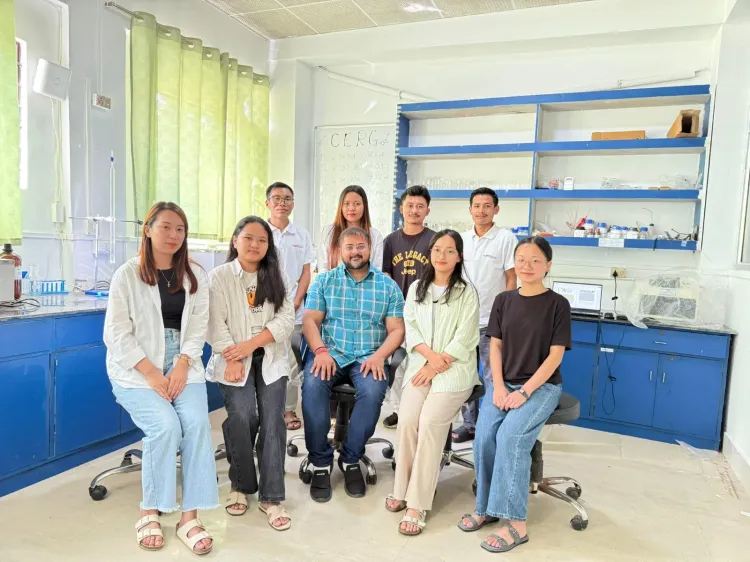Can Nagaland University Pave the Way for Eco-Friendly Corrosion Inhibitors?

Synopsis
Key Takeaways
- Lanthanide salts identified as next-gen eco-friendly corrosion inhibitors.
- Research published in a top-tier international journal.
- Offers a sustainable alternative to traditional harmful inhibitors.
- Significant implications for sectors like oil and gas and automotive.
- Research underscores the importance of green engineering.
Kohima, Aug 12 (NationPress) An international coalition of researchers, spearheaded by Nagaland University, has discovered lanthanide salts, a unique category of rare-earth compounds poised to act as next-generation, eco-friendly corrosion inhibitors, university officials reported on Tuesday.
Officials from the university indicated that this pioneering research, published in a top-tier international journal, paves the way for industrial applications across various sectors, such as oil and gas, marine engineering, automotive manufacturing, and renewable energy infrastructure.
Corrosion inhibitors are substances that decelerate or avert the corrosion (progressive deterioration) of metals when subjected to air, moisture, chemicals, or other environmental influences.
"As global industries grapple with increasing demands to transition from hazardous substances to sustainable alternatives, this research arrives at a pivotal moment. It not only offers a framework for future exploration but also serves as a strategic guide for industries looking to implement eco-friendly corrosion protection technologies," stated the Central university.
The findings highlight that the corrosion inhibition capabilities of inorganic salts remain largely untapped, despite their many advantages, including low toxicity, compatibility, long-term stability, and their effectiveness in protecting against corrosion in both solution and coating phases.
The study also explores the role of lanthanide salts in developing green corrosion inhibitors, emphasizing the potential for advanced characterization techniques, AI predictions, and computational design.
Various sectors, including oil and gas, confront significant challenges from electrochemical degradation, or the corrosion of metallic materials, leading to material failure and loss of mechanical properties. Such deterioration may pose safety risks, environmental issues, and substantial financial repercussions.
Inorganic salts appear to be promising sustainable alternatives to traditional harmful corrosion inhibitors such as chromates, molybdates, and nitrites, making them suitable for modern applications.
This research investigates the use of inorganic salts for advanced sustainable corrosion protection. These eco-friendly salts deliver remarkable corrosion resistance by inhibiting anodic and cathodic reactions, forming surface oxides and hydroxides, and obstructing the diffusion of corrosive agents to metal surfaces.
This groundbreaking study represents a significant advancement for sustainable materials science in India, undertaken by eight Ph.D. candidates from the Corrosion and Electrochemistry Research Group (CERG), Department of Chemistry, Nagaland University, under the guidance of Prof. Ambrish Singh.
Expressing congratulations to the research team, Nagaland University Vice Chancellor, Prof. Jagadish Kumar Patnaik, remarked: "As global industries contend with mounting pressure to shift from toxic materials to sustainable technologies, this discovery offers a strategic roadmap for adopting safe, effective, and environmentally responsible corrosion protection solutions. The findings not only respond to urgent industrial demands but also highlight Nagaland University’s dedication to impactful research with global significance."
The university extends its gratitude to all collaborating scientists, partner institutions, and funding organizations whose commitment has enabled this achievement. "We look forward to collaborating closely with industry stakeholders to ensure that this innovation benefits both the environment and the economy," he noted.
Expounding on the research, Prof. Ambrish Singh stated: "Our study incorporates comprehensive investigations into the chemistry, mechanistic pathways, and protective properties of lanthanide salts, alongside critical assessments of their performance, limitations, and potential. Unlike conventional toxic corrosion inhibitors based on chromates or heavy metals, lanthanide salts present low toxicity, strong adhesion to metal surfaces, and enhanced stability in aggressive environments—qualities essential for green and sustainable engineering."










